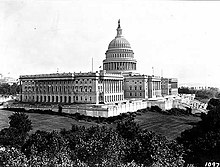62nd United States Congress
| 62nd United States Congress | |
|---|---|
|
61st ←
→ 63rd
|
|

United States Capitol (1906)
|
|
| March 4, 1911 – March 4, 1913 | |
| Senate President |
James S. Sherman (R) until October 30, 1912 Vacant from October 30, 1912 |
| Senate Pres. pro tem |
Augustus O. Bacon (D) Charles Curtis (R) Jacob H. Gallinger (R) Frank B. Brandegee (R) Henry Cabot Lodge (R) |
| House Speaker | Champ Clark |
| Members | 96 Senators 394 Representatives 7 Non-voting members |
| Senate Majority | Republican |
| House Majority | Democratic |
| Sessions | |
|
1st: April 4, 1911 – August 22, 1911 2nd: December 4, 1911 – August 26, 1912 3rd: December 2, 1912 – March 3, 1913 |
|
The Sixty-second United States Congress was a meeting of the legislative branch of the United States federal government, composed of the United States Senate and the United States House of Representatives. It met in Washington, DC from March 4, 1911 to March 4, 1913, during the third and fourth years of William H. Taft's presidency.
The apportionment of seats in the House of Representatives was based on the Twelfth Census of the United States in 1900. Additional House seats were assigned to the two new states of New Mexico and Arizona. The size of the House was to be 435 starting with the new Congress coming into session in 1913. The Senate had a Republican majority, and the House had a Democratic majority.
TOTAL members: 394
At this time, most Senators were elected by the state legislatures every two years, with one-third beginning new six-year terms with each Congress. A few senators were elected directly by the residents of the state. Preceding the names in the list below are Senate class numbers, which indicate the cycle of their election.
The names of members of the House of Representatives are preceded by their district numbers.
There were 20 changes: 6 deaths, 2 resignations, 1 invalidated election, 6 appointees replaced by electees, 4 seats added from new states, and 1 seat vacant from the previous Congress. Democrats had a 4-seat net gain, and no other parties had a net change.
Sorted Chronologically by date of vacancy
House vacancies are only filled by elections. State laws regulate when (and if) there will be special elections.
Lists of committees and their party leaders, for members (House and Senate) of the committees and their assignments, go into the Official Congressional Directory at the bottom of the article and click on the link (6 links), in the directory after the pages of terms of service, you will see the committees of the Senate, House (Standing with Subcommittees, Select and Special) and Joint and after the committee pages, you will see the House/Senate committee assignments in the directory.
...
Wikipedia
